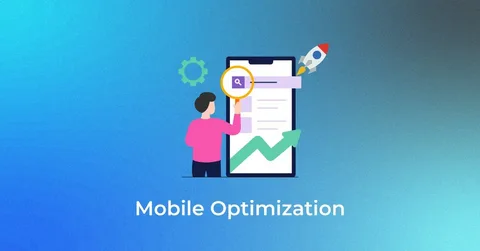I used to think having a website was enough, but I quickly learned that just having a site isn’t the same as having a good one. If visitors can’t navigate easily, find the information they’re looking for, or trust what they see, they’ll bounce in seconds. That’s why every business needs a professional website.
For me, what differentiates a bad website from a good one is paying attention to the little things: simple menus, fast loading times, clear messaging, and mobile-friendly layouts. The smoother the experience, the more professional your business feels, because let’s be honest, a frustrating website is a red flag.
Investing in thoughtful website design and intuitive web development ensures your site doesn’t just look good, it works well too. And that kind of experience builds trust, keeps users engaged, and drives conversions.
How a Professional Website Builds Trust with Customers
Understanding why every business needs a professional website starts with trust. When potential customers land on your site, they subconsciously ask, “Can I trust this brand?”
A clean, well-structured website design sends a clear message: “We care about our business, and yours.” A well-structured and polished site can completely change how people perceive a brand. It tells them you’re legit, established, and worth their time.
With proper web development and updated branding, your site becomes a place that feels reliable. Whether you’re showcasing products or collecting leads, a professional business website builds confidence before you even speak to your customer.
The Importance of User Experience in Web Design

Starting out, I didn’t fully understand how critical user experience (UX) was to a website. If your visitors can’t easily use your site, they’ll leave fast. That’s one of the clearest lessons in why every business needs a professional website.
User experience adds clarity, comfort, and flow to a website. By using readable fonts and intuitive navigation, your site is here to guide visitors, not confuse them. I’ve personally updated client sites with just a few UX improvements and watched bounce rates drop and engagement soar.
Good UX is the secret sauce behind strong website design. And when paired with solid web development, it ensures your business website isn’t just functional, it’s enjoyable.
SEO Best Practices for Your Website
When optimizing a site for SEO, visibility doesn’t happen by accident or luck; there’s a full SEO framework behind it, comprising many different optimization strategies. Part of understanding why every business needs a professional website is realizing how powerful good SEO can be.
If your site doesn’t appear on the search results page on top, you’re practically invisible to potential customers. To solve that, here are the SEO best practices I recommend for any business website:
Optimize Pages, Titles, and Meta Descriptions
This is your first impression in search results. Use relevant keywords and make them clear and clickable.
Use Proper Header Tags (H1, H2, H3) And Bullet Points
Structured content helps both users and search engines navigate your site more easily.
Improve Site Speed
A slow website hurts both user experience and your search ranking. Compress images, clean up code, and choose fast hosting.
Create Mobile-friendly Design
Search engines prioritize mobile-optimized sites. A responsive website design is a must.
Build internal And External Links
Backlinking to relevant pages within your own site and trustworthy sources builds authority.
Regularly Update Content
Fresh content tells Google your web development is active and your business is up-to-date.
Smart SEO is a long-term investment, but when done right, SEO brings in conversions even without paid ads.
Mobile Optimization: Why It’s Crucial for Success

If I had to pick one thing that made the biggest difference in my site’s performance lately, it would be mobile optimization. 60% of all the web traffic now comes from smartphones. With so many mobile users, Google also ranks mobile-optimized websites higher than others. So when people ask me why every business needs a professional website, I always bring up mobile first.
You could have the most beautiful website design on desktop, but if it doesn’t work smoothly on mobile, you’re losing visitors fast. People are scrolling while commuting, standing in line, or sitting on their couch. If they can’t navigate your site with their thumb and cannot make a purchase decision at that moment, they’re gone.
Here’s what I focus on when optimizing for mobile:
- Responsive design that adjusts beautifully across all devices
- Large, readable text and buttons that are easy to tap and work
- Fast-loading pages, because no one waits more than 3 seconds on mobile
- Simplified navigation, so users and search engine bots can find what they need quickly
- Click-to-call and contact shortcuts to encourage direct engagement
Good web development ensures your site performs well under any screen size. And when your business website feels intuitive on mobile, it builds trust, improves visitor retention, and boosts conversions.
How to Maintain and Update Your Website Regularly
Launching a website is only the beginning; optimizing the website is a whole other ball game. One of the points I always emphasize when explaining why every business needs a professional website is the importance of ongoing support and maintenance.
Think of your website like a store. If it’s dusty, outdated, has broken signage, or is situated at the very end of a deserted street, people simply won’t come..
A well-maintained business website not only performs better, but it also signals to visitors (and search engines) that your brand is active and trustworthy. Over time, I’ve built a simple system to keep things running smoothly.
Here are a few best practices I follow:
- Regularly update content to reflect current offers, products, or blog posts
- Check for broken links or buttons and fix them to improve SEO and user experience
- Keep plugins and software updated to maintain security and performance
- Back up your site frequently, so you’re protected in case something goes wrong
- Test forms and CTAs to make sure everything is working as intended
- Review analytics to see what’s working and what needs improvement
Your business doesn’t take a break, nor should your website.. Robust support and maintenance ensures that your website is always online and performs as it is developed to, fast and responsive.
If you’re looking for website development and maintenance services, contact me at California Web Coders, and I will help you develop a responsive website that is well-maintained and optimized for higher ranking.
All-In-All
In today’s digital world, your website is your business card, storefront, and salesperson; in simple words, an all-rounder. Why every business needs a professional website isn’t a question anymore; it’s a priority. A professional website helps you get discovered by the world. If any business isn’t investing in a website, it will struggle to survive and stay relevant in this competitive era.
Invest in strong website design, smart web development, and ongoing care to stay ahead, build trust, and grow with confidence. It will help your business be discovered and stay ahead of the competition.
If you are willing to invest in a website for your business, you can always talk to me at California Web Coders.
FAQs
- How can a professional website boost my business?
A professional website helps build trust, improves your brand’s visibility, and acts as a 24/7 salesperson. It attracts more visitors through strong website design, drives conversions with clear CTAs, and gives you credibility in the digital market. - What should I include on my business website?
Your business website should clearly showcase who you are, what you offer, and how to contact you. Must-haves include a strong homepage, service or product pages, an about section, testimonials, and a contact form. Adding a blog and FAQs can also improve SEO and user engagement. - Why is mobile optimization important?
Most people browse on their phones. If your site isn’t optimized for mobile, you risk losing visitors fast. Responsive web design ensures your content looks great and works smoothly on any device, which directly impacts bounce rate, user satisfaction, and even your search engine ranking.



